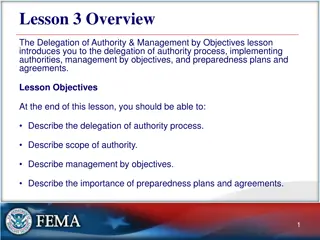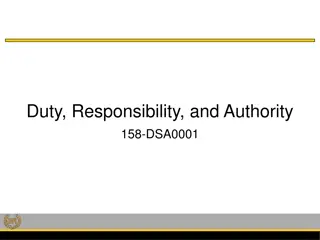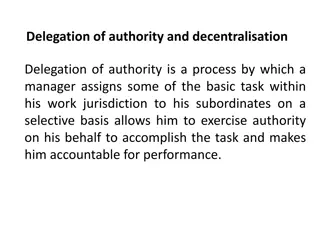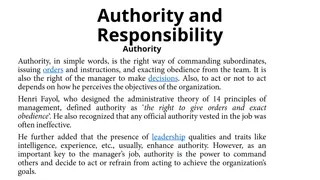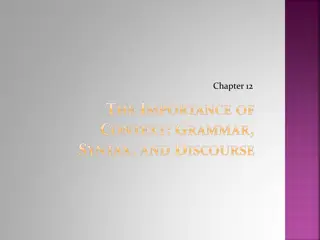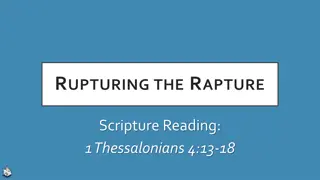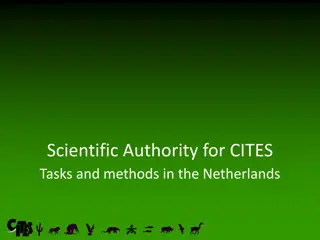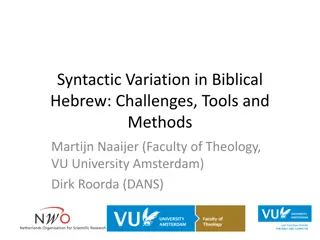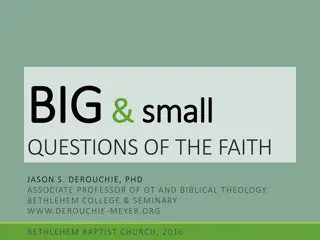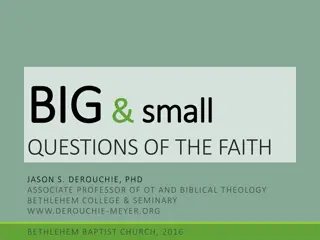BIBLICAL AUTHORITY
Delve into the depths of Biblical authority and its significance in faith and life. Explore how this foundational concept shapes beliefs, practices, and interpretations of Scripture. Gain insight into the principles and implications of embracing Biblical authority in personal and communal contexts. Engage with diverse perspectives and historical developments that have influenced the understanding and application of Biblical authority throughout the centuries. Discover the enduring relevance and transformative power of this fundamental pillar of Christian theology.
Download Presentation

Please find below an Image/Link to download the presentation.
The content on the website is provided AS IS for your information and personal use only. It may not be sold, licensed, or shared on other websites without obtaining consent from the author.If you encounter any issues during the download, it is possible that the publisher has removed the file from their server.
You are allowed to download the files provided on this website for personal or commercial use, subject to the condition that they are used lawfully. All files are the property of their respective owners.
The content on the website is provided AS IS for your information and personal use only. It may not be sold, licensed, or shared on other websites without obtaining consent from the author.
E N D
Presentation Transcript
Debate Discussion Conversation Dialogue Content Outcome Trust Respect Interchange Format Focus Questions Knowledge Risks Goal Listening Volition Regulated Win/Lose Low Trust Intolerant to Differences Facts and Arguments Statements What do I know Used to disarm/disguise opinions Used as a Weapon Avoid Risks Prove Rehearsal/Prep to Pounce Willful Control/Unwilling to change Unregulated Win/Win High Trust Embrace Differences Feelings, Values, Worldview Questions + Statements What can I learn? Used to Deepen understanding Used as a Gift Take Risks Explore Active Empathy Willing to Surrender/Change
THE BIBLE PROJECT WHAT IS THE BIBLE?
WHAT WORDS HAVE YOU HEARD OR USED TO DESCRIBE SCRIPTURE?
THE NATURE OF DIVINE INSPIRATION 1)The Bible, though written by individuals, has been so controlled by the Holy Spirit that is is without error in all it teaches in matters of science and history, as well as in matters of theology. 2)The Bible, though written by individuals and reflecting their personalities, has been so controlled by the Holy Spirit that it is trustworthy in all it teaches in matters of theology and ethics, but not necessarily in matters of science and history.
3) All of the Bible is both the inspired Word of God and at the same time a thoroughly human document 4) Portions of the Bible, including some of its theological and ethical positions, may not be the inspired Word of God. 5) The Bible is merely a record of the moral and religious experiences of Hebrew and Christians.
3 HISTORICALLY REFORMED VIEWS OF SCRIPTURE The Bible as a Book of Inerrant Facts The Bible as Witness to Christ, the Word of God A Divine Message in Human Thought Forms
WHAT DO OUR CONFESSIONS SAY? Nicene Creed 325 Apostles Creed 3rd-6th Century The Larger Catechism 1529 2nd Helvetic Confession 1566 The Barmen Declaration 1934 The Confession of 1967
NICENE CREED + APOSTLES CREED The third day he rose again, according to the Scriptures. Nicene Creed
THE LARGER CATECHISM Q. 3. What is the Word of God? A. The holy Scriptures of the Old and New Testaments are the Word of God, the only rule of faith and obedience.
Q. 4. How doth it appear that the Scriptures are the Word of God? A. The Scriptures manifest themselves to be the Word of God, by their majesty and purity; by the consent of all the parts, and the scope of the whole, which is to give all glory to God; by their light and power to convince and convert sinners, to comfort and build up believers unto salvation. But the Spirit of God, bearing witness by and with the Scriptures in the heart of man, is alone able fully to persuade it that they are the very word of God.
2ND HELVETIC CONFESSION We believe and confess the canonical Scriptures of the holy prophets and apostles of both Testaments to be the true Word of God, and to have sufficient authority of themselves, not of men. For God himself spoke to the fathers, prophets, apostles, and still speaks to us through the Holy Scriptures. And in this Holy Scripture, the universal Church of Christ has the most complete exposition of all that pertains to a saving faith, and also to the framing of a life acceptable to God
THE BARMEN DECLARATION Jesus Christ, as he is attested for us in Holy Scripture, is the one Word of God which we have to hear and which we have to trust and obey in life and in death.
CONFESSION OF 1967 Confessions and declarations are subordinate standards in the church, subject to the authority of Jesus Christ, the Word of God, as the Scriptures bear witness to him. No one type of confession is exclusively valid, no one statement is irreformable. Obedience to Jesus Christ alone identifies the one universal church and supplies the continuity of its tradition. This obedience is the ground of the church s duty and freedom to reform itself in life and doctrine as new occasions, in God s providence, may demand.
The Bible is to be interpreted in the light of its witness to God s work of reconciliation in Christ. The Scriptures, given under the guidance of the Holy Spirit, are nevertheless the words of men, conditioned by the language, thought forms, and literary fashions of the places and times at which they were written. They reflect views of life, history, and the cosmos which were then current. The church, therefore, has an obligation to approach the Scriptures with literary and historical understanding. As God has spoken his word in diverse cultural situations, the church is confident that he will continue to speak through the Scriptures in a changing world and in every form of human culture.
RETHINKING AUTHORITY Ancient Ambiguous Diverse Holy Perfect Clear
RETHINKING AUTHORITY Ancient Ambiguous Diverse Holy Perfect Clear WISDOM
RULEBOOK VS. WISDOM Rulebook answers deliver certitude and finality, but wisdom embraces mystery Rulebook answers are distant and passive, but wisdom is intimate and learned through experience Rulebook answers are immediate, but wisdom takes trial and error over time
RULEBOOK VS. WISDOM Rulebook answers provide comfort and stability, but wisdom asks us to risk letting go of what is familiar to embrace God s surprises Rulebook answers are designed to end the journey, but wisdom shapes us so we journey with courage and peace Rulebook answers are limited to specific moments, but wisdom works in all times and places Rulebook answers keep us small, but wisdom gives us the space we need to grow


